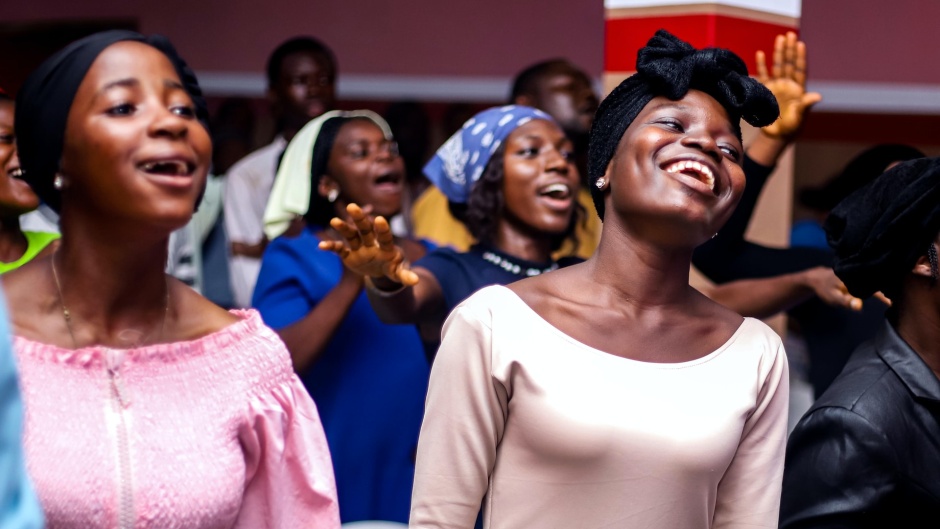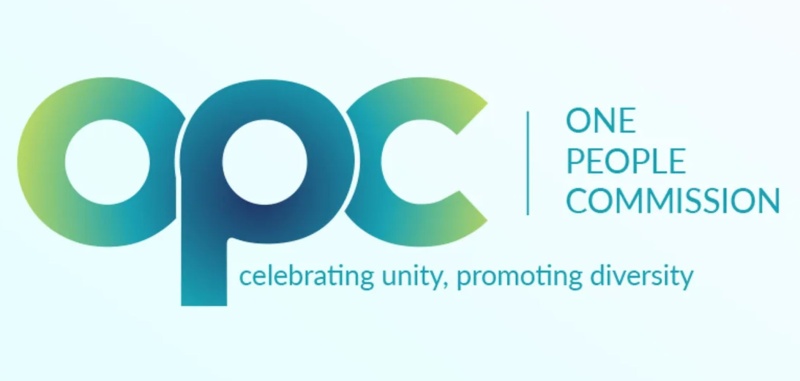“The presence of African missionaries and churches recognises the fact that Europe is a mission field”
There are almost 700 million African Christians, and many live in Western countries. Israel Olofinjana analyses the challenges and opportunities for African mission in Europe.
LONDON · 09 JUNE 2022 · 12:19 CET

How does African Christianity look like, and how are African Christians impacting Europe?
Over the past 50 years, the number of Christians in Africa has grown five-fold, from just above 100 million in 1970 to almost 700 million in 2020.
These huge numbers lead to a growing influence beyond the continent's borders. In Europe, thousands of church initiatives led by Africans make a difference in cities like London, Amsterdam or Berlin.
Evangelical Focus spoke to Israel Oluwole Olofinjana, head of the One People Commission (EAUK). He knows the African churches in the UK well and has a passion to bring Christians from all ethnic minority backgrounds to work together in mission.
Question. How are the concepts of “religion” and more specifically “religious freedom” understood in Africa?
Answer. The African worldview is religious. Religion permeates and shapes everything that we do, from even before birth to after death. You begin to see the contrast when you compare this with the European Enlightenment worldview. Europe of course used to adopt a religious worldview in the pre-Modern societies, but with a lot of shifts ‘God was deposed and reason was imposed’.
But this Enlightenment paradigm, I am pleased to say, did not affect Africa directly. It affected us indirectly, through colonialism, mission and other avenues, but the religious worldview in Africa is still very much intact. I am not talking only about Christianity, but African traditional religions (of which there are various types in different regions) and Islam. These three are three main in Africa.
As one African philosopher noted, Africans are notoriously religious in everything that we do: before people get on the public transport they pray, when they get off they pray, it shapes the kind of job you do, where you live…
It is in that context that we can address religious freedom and the issue of Christians being persecuted. The way we approach religious freedom in the West is so premised on individualism, whereas in Africa people look at this in terms of community. For example, if someone converts to Christianity, there are implications related to where they are converted from, and how that sometimes upsets the balance of society and community. I am not saying we should not share the Gospel, but there have been mistakes: we should understand the sensitivities around religion in Africa and what a conversion actually means to someone. Are Christians really prepared to embrace that person? I have friends for whom converting from Islam to Christianity meant to be ostracised totally, and thank God there were Christian families who were ready to take some of this people on.
Q. How do global denominations such as the Anglican Church, the Baptists, or the Pentecostal movements look different in Africa compared to Europe and other Western contexts?
A. They are very different. One of the big shifts in Africa is the explosion of Pentecostal and Charismatic expressions of Christianity. There have been various Pentecostal revivals in Africa from the 1920s to the 60s and 70s. These expressions are the fastest growing in Africa.
Sometimes people travel to Africa and go to an Anglican, Catholic or Baptist church, and say: ‘it felt very Pentecostal!’. Many left the mainline denominations to join Pentecostal churches in the last decades. So, other Christian denominations often try to adopt and copy useful things – to the extent that even Islam in Africa copies African Pentecostalism!
So, if you go to an average Baptist service, it might be Pentecostal and they even might speak in tongues. Pentecostal Christianity has really changed the landscape in several ways.
Q. How is the theology of churches different in Africa and Europe?
A. There are lots of distinctives… African theology is more oral: there are stories, testimonies, liturgy includes looking at African proverbs and poems to elucidate theological thought. I think Western theology is sometimes too rationalistic, too abstract.
In Europe, one would see how you can defend your thesis through a journal (which African theologians also do) but largely African theology is a practical theology, seeking to the experiences of people, seeking to contextualise and indigenise Christianity, making it relevant to the political or economic situation. Western Christianity also does that but is largely abstract in its operations.
In wrestling with the realities of people, there is also a post-Colonial thinking, efforts to decolonise colonial paradigms. It is fair to say that many Western theologies are not post-colonial, it is only now that we are beginning to catch up, there is still a lot of work to do.
Q. In contrast with all the hope-filled movements in Africa, there are also challenges, realities reported in the media and denounced by African intellectuals: abuse of power in some megachurches, close ties with political leaders and corruption, the debate around the Prosperity Gospel… What are good African Christian leaders doing to address these issues?
A. I think those challenges do exist. At the end of the day, every form of Christianity that we have has its own weaknesses. There is sometimes abuse of leadership, which at times manifests itself in hero worship, and extreme versions of the Prosperity Gospel that lend themselves to only a few people prospering at the expense of the masses.
We see those problems, and they have been addressed in various means by the churches. But we have to be very careful, because when we talk about African Christianity, we should be talking about ‘African Christianities’ in the plural. Or ‘African theologies’. Do we speak about theologies that emanate from francophone contexts or anglophone countries? Are we speaking about the evangelical African theology or the Catholic evangelical theology?
A. The United Kingdom seems to be a place where there is a high concentration, perhaps because of the geography and the connection of British history with African history. Some African churches in the UK go back to the 18th century, and there has been a proliferation of these churches over time.
Netherlands, Germany and Sweden have a lot of African churches, Spain and Italy as well.
And again, African Christianity in Europe is not homogeneous. There are African indigenous churches (AICs), African Pentecostals, African churches within the mainline European denominations… So, there are these various expressions all over Europe planting churches and extending. In fact, some of the largest churches in Europe are led by Africans. Even in Ukraine, before the war, there was a massive church led by a Nigerian.
Q. Would Nigeria be one of the main countries from which missionaries are sent to Europe? What are others?
A. There a lot of Ghanian missionaries and Christians across Europe. Also Zimbabweans, Gambians and Kenyans. Some are intentionally sent, some have come as refugees, asylum seekers or economic migrants, but nevertheless engage in God’s mission in the European space. So, there is a mixture of different factors but people are engaging in mission.
Today, an average missionary in Europe could be a refugee from Ethiopia or an economic migrant from Cameroun. Those are the ways Africans are changing our understanding of who is a missionary in the 21st century.
The presence of African missionaries and churches recognises the fact that Europe is a mission field. Before, Europe was never conceived as that, the emphasis was always: ‘we need to go to Africa, we need to go to Latin America or Asia’. But now we have many have come to Europe with that sense of calling.
Q. What are the good contributions that Africans can bring to local churches in Europe’s secularised societies?
A. There are several layers to that question. There are challenges to African mission and at the same time there is an open window of opportunity. European missions in Africa were coming from a supposed civilised superior culture into an inferior one. And now, the secular agenda in Europe means that people see religion as no longer relevant. Although we’re already talking about ‘post-secularism’ (where religion and the secular coexist), there is still an understanding of a liberal democracy and human rights in which religion is something that is confined to a private space, not the public.
Therefore, for an average missionary coming from Africa, mission has a double barrier to overcome: one is coming from a so-called ‘developing culture’ into a developed space. And then, the challenge of mitigating and understanding the secular thinking before you can even engage in mission.
That sense of optimism and faith that God can change things is one that I think African Christians have really brought in. It is no surprise that they are the ones growing the fastest, because of their raw faith in God, their passion, and their belief that miracles can still happen today. They have not been tempted by the rationalistic worldview that reduces our world to the natural. They still believe in the supernatural. That infuses optimism and challenges the secular worldview. It says there is not only narrative: yes, there is the natural but what about the supernatural?
African Christians in Europe are putting back religion on the table. They are saying: ‘God does exist and, actually, here is my personal story, my testimony, what do you think about it?’
If we walk in partnership, that will help us develop and contextualise the gospel for the European space. After all, Europe is not monocultural. Europe itself has changed and is very multicultural now. We need all the divine wisdom of God, as Paul puts it in Ephesians chapter 3, the multi-faceted wisdom of God.
We need this today in the European context.
Unity, integration, justice

Israel Ollofinjana leads the One People Commission of the Evangleical Alliance United Kingdom. It is a network that brings together different church leaders from the black majority church constituency, the south Asian constituency, Chinese churches, Latin American churches and South Korean churches.
“It exists with three focuses. To model that God’s people are one. Speaking with one voice. And engaging in one mission: God’s mission”, says Olofinjana. The working group’s emphases are on intercultural church unity, intercultural churches and intercultural justice. “Simply put: unity, integration and justice. That is what we are seeking to do”.
Published in: Evangelical Focus - europe - “The presence of African missionaries and churches recognises the fact that Europe is a mission field”
Since you are here…
Evangelical Focus is a news and opinion platform that brings together Christians from across Europe and other parts of the world. We need the support of our readers to make this media project sustainable in the long term. You can support our work! Read about Evangelical Focus’s sustainability here.
Would you like to support the work of Evangelical Focus?
Use one of these methods. You can also transfer your donation to “Areópago Protestante / Evangelical Focus” IBAN: ES8521000853530200278394 (Swift / BIC: CAIXESBBXXX). Subject: “Donation Evangelical Focus”
